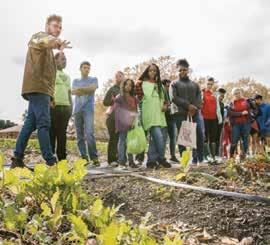
26 minute read
Around Campus
Around
CAMPUS
Mark Batzer Nichole Bauer
Kevin Benham Stephania Cormier
Willis Delony Zhiqiang Deng
Tammy Dugas
Noteworthy
Mark Batzer, a Boyd Professor and the Dr. Mary Lou Applewhite Distinguished Professor of biological sciencs, was among thirty-eight academic inventors named to the National Academy of Inventors. Batzer, along with former graduate student Dale Hedges and current staff scientist Jerilyn Walker, holds multiple patents in forensic DNA analyses that have been commercialized. In addition, he and his research group have published more than 290 original research articles, including many with undergraduate, graduate student, and postdoctoral coauthors.
Nichole Bauer, assistant professor of political communication, Manship School of Mass Communication and Department of Political Science, was awarded more than $100,000 in a three-year grant by the Louisiana Board of Regents to support her research examining citizens’ responses to female-dominated political institutions and political leadership. The grant will fund her project entitled “Feminizing Political Institutions: Does Increasing the Number of Women in Politics Change How Citizens Stereotype Political Institutions?”
Kevin Benham, the Jon Emerson/Wayne Womack Design Professor and assistant professor of landscape architecture, was awarded a Rome Prize 2020-2021 fellowship to advance his research on transhumance. The fellowships, presented by the American Academy in Rome, support advanced independent work and research in the arts and humanities. This year, fellowships were awarded to twenty-two American and two Italian artists and scholars.
Stephania Cormier, the Werner Chair Professor of biochemistry and molecular biology, and Rebecca Christofferson, assistant professor of pathobiological sciences at the School of Veterinary Medicine, developed a saliva-based test to help track COVID-19 in K-12 school children and teachers in Baton Rouge. The initiative received mention during congressional hearings when Assistant Secretary for Health at the Department of Health and Human Services Admiral Brett Giroir testified that such programs are part of the robust surveillance system needed to track COVID-19.
Willis Delony, a Boyd Professor and the Virginia Martin Howard Professor of Piano & Jazz Studies, was named LSU’s honoree for the 2020 Southeastern Conference Faculty Achievement Award. Delony is one of the nation’s leading classical and jazz crossover artists, with a performance career spanning more than four decades. The individuals selected for the Faculty Achievement Award represent the best academics throughout the SEC and become his or her university's nominee for the SEC Professor of the Year Award.
Zhiqiang Deng, professor of civil and environmental engineering, was awarded a $750,000 award from NASA and a $750,000 matching grant from the Louisiana Board of Regents for his project Satellite-Assisted Forecasting Environment for Improving Oyster Safety (SAFE Oyster). It was selected for the federal award by the NASA Established Program to Stimulate Competitive Research (EPSCoR) Program Office. Deng proposes using innovative NASA satellite-based information products to enhance the forecasting of norovirus and vibrio risks of oysters harvested along Louisiana and other Gulf Coast areas.
Tammy Dugas, professor of comparative biomedical sciences at the School of Veterinary Medicine, was named head of the department's biomedical research program and advanced degrees. Dugas joined the faculty in 2014.
Judith Anne Garretson Folse, professor of marketing, coauthored an article accepted for publication by the Journal of the Academy of Marketing Science. "The Interplay Between Business and Personal Trust on Relationship Performance in Conditions of Market Turbulence" discusses how businesses need to engage with customers during times of turbulence. The focus of this article is on both business and personal trust and the value of its combination, based on firm data.
Mara Gibson, associate professor of composition in the School of Music, will pursue a unique music composition project for bassoon and orchestra inspired by the lithographs of M.C. Escher. She was awarded a $32,300 grant from the Awards to Louisiana Artists and Scholars (ATLAS) program of the Louisiana Board of Regents, to fund the project titled, “Escher Keys,” which will explore the interactive possibilities between the bassoon, an instrument lacking in repertoire, and the orchestra, investigating the ideas of negative and positive space.
Cassandra Glaspie and Michael Polito, assistant professors of oceanography and coastal sciences, are among twenty U.S. faculty selected for the Early-Career Research Fellowships. Now in its sixth year, the fellowship is awarded to emerging scientific leaders who are prepared to work at the intersections of environmental health, community health and resilience, and offshore energy system safety in the Gulf of Mexico and other U.S. coastal regions.
Jenifer Godfrey was promoted to assistant dean of admissions and recruitment at the School of Veterinary Medicine. Godfrey joined the school in 2017 as director of admissions and enrollment. In addition to overseeing admissions, she teaches a course on ethics and jurisprudence.
Gabriela González, Boyd Professor of physics, was elected as a general councilor of the American Physical Society for 2021. The council oversees all activities of the society including publications, scientific meetings, membership, prizes and awards, and educational activities.
The National Science Foundation (NSF) awarded $138,613 to Manship School of Mass Communication researchers Michael Henderson, director of the LSU Public Policy Research Lab, and the late Martin Johnson, Kevin P. Reilly, Sr. Chair in Political Communication and dean of the Manship School of Mass Communication were awarded $138,613 by the National Science Foundation to further research on social and economic recovery from the COVID-19 pandemic in Louisiana. The NSF Rapid Response Research (RAPID) grant will their study, "Pandemic Anxiety, Recovery, and Inequality: Evaluating Institutions and Policy in a Coronavirus Hotspot.”
Nancy Isenberg, the T. Harry Williams Professor of American History, had her biography of Aaron Burr cited by the U.S. Supreme Court in a landmark ruling over presidential immunity from criminal proceedings. Isenberg penned the prizewinning biography, Falling Founder: The Life of Aaron Burr, in 2007.
Sigrid Kelsey, LSU Libraries, was named to the editorial board of Library Diversity and Residency Studies, an open-access, peer-reviewed journal that publishes articles on the social justice project of increasing diversity, equity, and inclusion in the library profession and curricula. Kelsey led the implementation of LSU Libraries Diversity Residency Program and has administered it since its implementation in 2018.
Judith Anne Garretson Folse Mara Gibson
Cassandra Glaspie Michael Polito
Jenifer Godfrey Gabriela González
Michael Henderson Martin Johnson
Nancy Isenberg Sigrid Kelsey

Jonathan Levesque Jun-Hong Liang
Lori Martin Nikki Fargus
Kevin Nickelberry Patricia Persaud
Cyntha Peterson Dandina Rao
James H. Spencer Mingxuan Sun Jonathan Levesque, IT manager and building coordinator at the Cox Communications Academic Center for Student-Athletes (CCACSA), is serving as the fortieth president of the LSU Staff Senate. Levesque joined CCACSA in 2012, after serving as the technology coordinator at Redemptorist High School. He also worked for several technology companies after serving in the U.S. Navy on the USS Pittsburgh.
Jun-Hong Liang, associate professor in the Department of Oceanography & Coastal Sciences received a five-year National Science Foundation Faculty Early Career Development (NSF CAREER), which recognizes junior faculty who “have the potential to serve as academic role models in research and education and to lead advances in the mission of their department or organization.” The award will support his research into how ocean bubbles play an important role in upper ocean dynamics and in air-sea gas exchange and will enrich the curriculum in physical oceanography and outreach activities at LSU and in local communities.
Lori Martin, professor of African & African American Studies; Nikki Fargus, women’s basketball coach; and Kevin Nickelberry, men’s basketball assistant coach are among the notable African Americans who have formed a new nonprofit organization, the Advancement of Blacks in Sports (ABIS), with a mission to connect and inspire people to boldly advocate for racial, social, and economic justice for Blacks in sports. Officially launched in September, ABIS works to foster a culture of equity and inclusion in all aspects of sports. Visit www.weareabis.org.
Patricia Persaud, assistant professor of geology and geophysics, was named a 2020–2021 fellow at the Radcliffe Institute for Advanced Study at Harvard University, joining an impressive class whose work will span the sciences, social sciences, humanities, and arts. As the Edward, Frances, and Shirley B. Daniels Fellow, Persaud will pursue an individual project in a community dedicated to exploration and inquiry. Her research focuses on identifying the risk of humaninduced earthquakes in Louisiana. Photo: April Buffington
Cyntha Peterson, dean of the College of Science, was elected to the board of directors of the Environment and Health Council of Louisiana.
Dandina Rao, professor of petroleum engineering, was named editor-in-chief of Petroleum Science and Technology, an international journal that publishes original, high-quality, peer-reviewed research and review articles that explore various aspects of the petroleum industry.
James H. Spencer was appointed vice provost and dean for the LSU Graduate School, effective Aug. 3. He was also appointed a professor in the School of Architecture. He was most recently a professor of city and regional planning and associate dean of the College of Architecture, Arts & Humanities at Clemson University, as well as Adjunct Senior Fellow at the East West Center in Hawaii. Spencer holds a bachelor of arts degree from Amherst College, a master's degree in environmental management from Yale University, and a doctorate in urban planning from UCLA.
Mingxuan Sun, assistant professor of computer science and engineering, received the NSF CAREER Award for her “Privacy-aware Predictive Modeling of Dynamic Human Events,” project, which is supported by the NSF Information & Intelligent Systems Division. The $422,815 grant runs from June 2020 to May 2025. Sun is expected to develop a series of novel models and algorithms to analyze dynamic human events.
Graça Vicente Tyrslai Williams-Carter
Isiah Warner Gretchen Schneider
An LSU team received the University’s first – and Louisiana’s second – MARC award from the National Institutes of Health to boost diversity in Craig Wooley biomedical research. The Maximizing Access to Research Careers (MARC) T34 program for juniors and seniors interested in pursuing advanced degrees in biomedical or behavioral sciences. Graça Vicente, the Charles H. Barré Distinguished Professor of chemistry and IMSD program director, is principal investigator (PI). Co-PIs are Tyrslai Williams-Carter, director of research, education, and outreach programs in the Office of Strategic Initiatives, and Vice President of Strategic Initiatives Isiah Warner, Boyd Professor and the Phillip W. West Professor of surface and analytical chemistry. Gretchen Schneider, manager of public relations and community outreach in the Department of Chemistry, is program manager.
Craig Wooley was named LSU’s chief information officer (CIO) in August. He was most recently CIO at Wright State University and previously served as the assistant vice president for information technology at the University of South Florida (USF). He earned a bachelor’s degree in engineering technology and a master’s in instructional technology from USF. 1. Who was named Most Valuable Player in LSU’s first BCS National Championship in 2003? Matt Flynn Justin Vincent Anthony “Booger” McFarland JaMarcus Russell
2. When was Paul Dietzel’s first season as football coach? 1955 1958 1966 1980
3. What was the first fraternity to be established at LSU? Zeta Beta Tau Sigma Chi Tau Kappa Epsilon Kappa Alpha
4. When could LSU students first participate in Navy ROTC? 1860 1916 1971 1989
5. Who was the first Black professor to teach at LSU? Julian White Huel Perkins Kirt Bennett A.P. Tureaud, Jr.
6. Which LSU professors conducted Louisiana’s first complete geological and topographical survey? Henry Howe and Samuel Lockett and Richard Russell Frederick Hopkins Fred Kniffen and Sam Wilson Thomas Boyd and David Boyd
7.
What was the title of the study in question 6? Louisiana, Its Land and People Louisiana, This One’s for You A Louisiana Journal Louisiana As It Is 8. Which dormitory was named for an LSU alumna killed in 1944 while saving other Marines from a burning building? Joan Miller Hall Grace King Hall Germaine Laville Hall Lizzie McVoy Hall
9. What were the campus radio station’s call letters before they became KLSU? WPRG WLSU KFGC All of the above
10.What was LSU’s first student-published literary magazine? Delta Southern Review Pell Mell Whangdoodle 11. How was construction of the Memorial Tower paid? Taxpayer funding A combination of a fundraising program led by the American Legion and an appropriation from the Louisiana Legislature An appropriation from LSU president Thomas Boyd wrote Congress a personal check to cover the expenses
12.With which other university did LSU discuss a proposed merger in 1971? Southeastern Louisiana University of Southwestern University Louisiana Southern University SOWELA Technical Community College
Tiger Trivia is compiled by Barry Cowan, assistant archivist, Hill Memorial Library.

LSU Press received a Coronavirus Aid, Relief, and Economic Security (CARES) grant from the National Endowment for the Humanities (NEH). "A Humanities Mission Endangered: Sustaining LSU Press" will provide support for day-to-day operations in the midst of the ongoing pandemic. LSU Press was one of 317 successful applicants chosen from among more than 2,300 applications.
The LSU Libraries T. Harry Williams Center for Oral History received $10,000 in emergency relief from the Louisiana Endowment for the Humanities (LEH) as a part of the Coronavirus Aid, Relief and Economic Security (CARES) Act to fund a graduate assistantship for the 2020-2021 academic year.
LSU received the 2020 Sustainability Innovation Award from the Association of Physical Plant Administrators. The award recognizes and promotes “unique and innovative sustainable practices in the educational facilities and campus environments, ultimately embedding them within the educational institution.”
LSU has licensed access to a vast library of bioremediation microbes to the national environmental services firm Cameron-Cole. The library was developed by Environmental Sciences Professor Emeritus Ralph Portier over almost forty years as he and LSU helped private companies as well as local, state, and national government organizations mitigate a wide range of environmental hazards in the U.S. and across the globe.
LSU received the 2020 Higher Education Excellence in Diversity, or HEED, Award from INSIGHT Into Diversity magazine, a national honor recognizing U.S. colleges and universities that demonstrate an outstanding commitment to diversity and inclusion. This is eighth year LSU has been named as a HEED Award recipient.
In U.S. News & World Report’s 2021 edition of Best Colleges, LSU is ranked in the top tier for Best National Universities for the thirteenth straight year, and the undergraduate petroleum engineering program ranks second overall. The University is ranked thirty-sixth among flagship universities nationwide – ahead of other flagships such as West Virginia University, University of Rhode Island and the University of Nevada – and seventy-first among public universities – ahead of public peers such as Kansas State University and Oklahoma State University. LSU remains as the highest ranked public university in Louisiana, and in the SEC, LSU ranks ahead of the University of Arkansas, University of Mississippi and Mississippi State University.

A HOME FOR YOUR TIGER PRIDE. A HUB FOR YOUR CONNECTIONS.

GET SOCIAL WITH US! LIKE US. FOLLOW US. JOIN US.
LSU Alumni Association The Cook Hotel and Conference Center at LSU Tiger Advocates

@AlumniLSU @TheCookHotel @TigerAdvocates
@LSUAlumniAssociation @CookHotelLSU
LSU Alumni Association

Collis B. Temple, Jr. Patrick C. Morrow, Sr.
Raymond R. “Randy” Morris Richard Zuschlag Jason Doré, president of the Star & Crescent Foundation.

The Star & Crescent Foundation, the nonprofit foundation established by Kappa Sigma Fraternity at LSU, awarded more than $160,000 in scholarships to 141 LSU students in financial need this fall, including thirty-one students from Baton Rouge. "We're honored to award a record number of deserving students with scholarships this year and are immensely proud to continue supporting excellence within the LSU education system," said Jason Doré, foundation president. "All of these young men and women are outstanding examples of what it means to be an LSU Tiger, and we're proud to invest in their futures."
Hailing from more than forty cities across ten states, the winners – both full- and part-time students enrolled in LSU’s undergraduate, graduate, and professional programs this fall - received scholarships in amounts ranging from $500 to $3,000.
Four Named to LSU Board of Supervisors
Governor John Bel Edwards named four new members to the LSU Board of Supervisors in July. Joining the board are Collis B. Temple, Jr. of Baton Rouge, chief executive officer, Harmony Center, 6th Congressional District; Patrick C. Morrow, Sr., of Opelousas, La., founding partner Morrow, Morrow, Ryan, Bassett & Haik, 5th Congressional District; Raymond R. “Randy” Morris, of Monroe, La., founder, West Carroll Health Systems, 5th Congressional District; and Richard Zuschlag, of Lafayette, La., president of Acadian Ambulance Service, member-at-large.
The new members replace Blake Chatelain, James Moore, Stephen Perry, and Bobby Yarborough, whose terms expired June 1.
As part of ongoing efforts to cultivate a more inclusive, equitable, and diverse campus community that is welcoming to all, Interim President Thomas Galligan named sixteen individuals to the newly formed Building Name Evaluation Committee. The faculty, staff, students, and alumni serving on the committee are: • Verge Ausberry (staff) - LSU
Athletics Executive Deputy Athletic
Director/Executive Director of
External Relations • DeMetris Causer (student) - Black
Law Students Association Member • Stone Cox (student) - LSU Student
Government President, Board of
Supervisors Member • Jason Droddy (staff) - Associate Vice
President, LSU Board of Supervisors • Katrina Dunn (alumna) - LSU National
Diversity Advisory Board, President of the A.P. Tureaud, Sr. Black Alumni
Chapter, Practice Administrator, Coowner, Auburn Urogynecology and
Women’s Health • Theresa Gallion (alumna) - LSU
Foundation National Board member,
TAF Board of Directors, Partner at Cornell Smith Mierl Brutocao
Burton, LLP • Tina M. Harris (faculty) - Douglas L.
Manship, Sr.-Dori Maynard Endowed
Chair of Race, Media, and Cultural
Literacy, Manship School of Mass
Communication • Tyler Hunt (student) - Black Women’s
Empowerment Initiative Scholar • Dawn Jenkins (staff) - College of
Science Director of Communications • Trey Jones (staff, ex-officio member) -
Deputy General Counsel • Jonathan Levesque (staff) - IT
Manager and Building Coordinator,
LSU Staff Senate President • Mandi Lopez (faculty) — Director
Laboratory for Equine and
Comparative Orthopedic Research,
LSU Faculty Senate President • Theda Daniels-Race (faculty) - Michel
B. Voorhies Distinguished Professor • Dereck Rovaris (staff) - Vice Provost for Diversity • James Stoner (professor) - Hermann
Moyse, Jr. Professor of Political
Science • Devin Woodson (student) - Black
Male Leadership Initiative Co-chair
Any committee recommendation to remove a building name will be evaluated first by the existing Naming Committee, followed by Executive Vice President and Provost Stacia Haynie, Interim President Galligan, the Board Academics Committee, and the LSU Board of Supervisors.
The committee is part of a broader effort to eliminate racism on campus and create a living and learning environment that not only embraces individual difference but also thrives because of it.
At the Inclusion, Equity, and Diversity Leadership Retreat in July nine committees were created to bring the action items outlined in the Diversity & Inclusion Roadmap 2020-2022 to fruition in a timely manner.

Photos: Chris Parent/LSU Athletics


LSU and Southern University students, student-athletes, coaches, and staff at the “Enough is Enough: Rally for Unity.”

LSU and Southern University students, student-athletes, coaches, and staff gathered at Free Speech Alley on June 12 for the “Enough is Enough: Rally for Unity.” Both schools coordinated the event, which allowed participants to share their respective experiences at the predominantly white university and the historically black university. "What's happening right now in our lifetime is we are witnessing the demand of social change and equal justice in the wake of the death of George Floyd," said Nikki Fargas, LSU women’s basketball coach. "We are seeing how communities from all over the world are demonstrating their support to condemn all racism. Through our platforms, we always want to strive to promote a culture where racism and inequality are not tolerated. It's about hearing and engaging, and being diligent in our efforts. As a community we can be the change, we will be the change."

LSU Fall Enrollment, Retention Rates at an All-Time High
For the third-straight year, LSU has broken the record for the largest and most diverse freshman class in University history. This year’s 6,690 freshmen enrolled surpasses last year’s record of 6,126 freshmen. Despite the COVID-19 pandemic, overall enrollment at LSU is at an all-time high of 34,290, and the University also saw high marks for retention and graduation rates.
With a record-breaking 6,690 full-time freshman enrolled, diversity of the class is also at an all-time high. The freshman class is made up of 16.8 percent Black students, topping the 15.8 percent of Black students in the 2018 class. Hispanic students in the freshman class is also a record high of 9.1 percent for the 2020, exceeding the 8.1 percent in the 2019 class. Students who identify as either American Indian, Black, Asian, Native Hawaiian, Hispanic, and two or more races make up more than 30 percent of the total freshman class this year. In the last ten years, LSU has seen overall enrollment of Black students increase 87 percent to 5,028 and Hispanic student enrollment increase 130 percent to 2,490.
With the growth of the freshman class, the quality of student entering LSU has not wavered. The GPA for the freshman class is an all-time high close to 3.5, and the ACT has remained steady when compared to previous classes at over 25. The Roger Hadfield Ogden Honors College is seeing record-breaking numbers as well, with freshman enrollment exceeding 800 students for the first time in the college’s history. The freshman honors class also has an average ACT of 32 and average GPA of 3.81 – both new records as well.
LSU continues to retain students at record rates. First-tosecond-year retention is at a record high of 85.8 percent, while first-to-third-year retention is also up from last year to 74.8 percent.
LSU is also seeing high marks in baccalaureate graduation rates. The six-year baccalaureate graduation rate (not including students who successfully complete a transfer preparatory program such as pre-nursing and pre-allied health) for freshman entering LSU in 2014 is 65.7 percent, the second highest in LSU history. In addition, the five-year baccalaureate rate for freshman entering in 2015 is 61.9 percent, the second highest five-year rate in LSU history.
Records broken by the 2020 LSU student body: Total enrollment of 34,290; freshman enrollment of 6,690; Black freshman enrollment of 16.8 percent; Hispanic freshman enrollment of 9.1 percent; GPA for the freshman class of 3.4; Ogden Honors College exceeds 800 new freshman for the first time ever; Ogden Honors College freshman average ACT of 32 and GPA of 3.81; first-to-second-year retention of 85.8 percent; first-to-third-year retention of 74.8 percent.
Near records for 2020 LSU student body: Six-year baccalaureate graduation rate for freshman entering LSU in 2014 is 65.7 percent; five-year baccalaureate rate for freshman entering in 2015 is 61.9 percent; average ACT of freshman class of 25.4.
USE YOUR LOUDEST ROAR Join Tiger Advocates
Get involved now to protect LSU and higher education in Louisiana. We want LSU TIGER NATION – alumni, friends, fans, future alumni, faculty, and staff – to be well informed on legislation that might impact YOUR University.
WHY SHOULD YOU BECOME A TIGER ADVOCATE:
Help support the future of our state’s most gifted future alumni.
Keep vital research going to address our state’s most pressing problems.
Support University parish extension offices throughout the state that spread the wealth of LSU research.
Help LSU continue to produce alumni community leaders across the state.
WHAT DOES BECOMING A TIGER ADVOCATE MEAN?
You will receive email notifications at critical times when your voice needs to be heard in the Louisiana Legislature.
With just a click or call, your legislators will know LSU TIGER NATION is closely monitoring legislative decisions that impact LSU.
Your legislators represent YOU. Show them you are for LSU.
Signing up is easy, free, and taking part requires a minimal investment of your time. Show your Love for LSU by signing up at lsualumni.org/tiger-advocates


An MBA for Working Professionals Flores Executive MBA Flex
By Bridget Conrad Times are changing, and so is the landscape of business education. In the past, there were two types of curriculum – campus-based classes and online classes. Now, amid the largest disruption ever in higher education, the E.J. Ourso College of Business is one of the first business colleges in the south to introduce a flexible hybrid MBA format that gives students the best of both campus-based and online instruction. The Flores Executive MBA Flex track will provide professional students with an innovative approach to learning, making it easier for them to manage their time effectively. “With our Flores Executive MBA Flex format, we are providing new opportunities for our students. We’ve rethought our delivery, so students get the in-depth mastery of our academic business disciplines, but now we’ve added an experiential learning component. Through this track, students have opportunities to work on consultative projects with companies, delivering solutions to those companies in real-time,” said Flores MBA Director Dana Hart. “Students will see that they are adding value to companies but will also have a peer-learning, academic experience. Throughout this track, students are consistently working with a network of peer MBA students to maximize the overall potential of their MBA experience.” Launching in January 2021, this format is a total of thirty-six credit hours, taking twenty months to complete. On-campus residencies take place one weekend a month, creating more flexibility for students who are working professionals. Students will focus on Flores Executive MBA Flex students get the in-depth mastery of academic business disciplines with an experiential learning component. things like professional/career development, executive coaching, and experiential learning on Friday afternoons, with Saturdays designated for classroom instruction. Today, business education is very much an evolving landscape. “The “The E.J. Ourso traditional pillars remain the same – marketing, finance, accounting, strategy –
College of Business but how we deliver these courses is different now. You are seeing programs move away from their full-time, campus-based delivery to go exclusively online. is one of the first We still wanted to capitalize on the on-campus experience, where students business colleges in can develop relationships, but at the same time maintain flexibility with online classes,” Hart said. the south to introduce The Flores MBA Program considered moving to a part-time hybrid delivery a hybrid MBA format.” for some time, and the pandemic was the driving force that accelerated the conversation. It has forced many businesses to disrupt what they do, and now, many business schools across the country are thinking differently about the MBA experience. Candidates want to maximize their time, effort, and value, so LSU strives to demonstrate a value proposition to its candidates and stakeholders. The Flores Executive MBA Flex may have a different delivery, but it’s still relevant, and students will get a substantial experience with a tangible return on investment on the overall MBA degree.

Bridget Conrad is assistant director of communications and external relations at the E.J. Ourso College of Business.



By Alison Satake Photos: The Walls Project

LSU Coastal Sustainability Studio will partner with The Walls Project to develop a master plan for the Baton Roots Community Farm, which opened last year in North Baton Rouge.
Baton Roots Community Farm opened last year in North Baton Rouge as a restorative landscape to support healthy lifestyles, mental welfare, and environmental security. With recent support from the National Endowment for the Arts, the LSU Coastal Sustainability Studio will partner with the nonprofit organization The Walls Project, which operates Baton Roots Community Farm at BREC Howell Park, and Mayor-President Sharon Weston Broome’s HealthyBR initiative, to develop a comprehensive master plan and site design for the 115-acre site. LSU Coastal Sustainability Studio faculty and students will lend their expertise in design and engineering to help develop the plan with the local community, BREC, and Build Baton Rouge, the parish’s redevelopment authority.
“The LSU Coastal Sustainability Studio will facilitate design studios where our students and faculty will work collaboratively with artists and design consultants to help develop a master plan for the Baton Roots Community Farm. Our intention is to help this valuable community space expand in scope from urban agriculture to creative place making by incorporating public art with community gardening, green infrastructure and urban ecology,” said Nicholas Serrano, LSU assistant professor of landscape architecture, who is a principal investigator for the project.
Baton Roots Community Farm grew from the mayor’s Geaux Get Healthy initiative, a project of HealthyBR, to improve the well-being of citizens by promoting active lifestyles and access to fresh foods in one of the city’s largest food deserts.
“We are honored to be selected by the NEA for this prestigious grant. Baton Roots is the culmination of eight years of building partnerships to elevate our impact with arts, workforce, and community health programs. The Walls Project welcomes all residents of Howell Park and leaders from across the city to be a part of the planning process. Together we will explore ideas for community amenities at the farm like a new event pavilion equipped with an outdoor demonstration kitchen, farmers market, and a public art system throughout the entire park to inspire the imagination and encourage exercise among people of all ages outdoors,” said Casey Phillips, The Walls Project executive director.
Baton Roots Community Farm opened in January 2019 during MLK Fest with the intergenerational Harmony Garden and is expanding to four acres of farm rows to yield 200,000 pounds of fresh food in North Baton Rouge. It currently offers multiple programs including a youth urban agriculture training program, Hustle & Grow, and “Garden In a Box,” which promotes backyard gardening to
promote healthy eating and food security. The new NEA Our Town grant will fund the development of a comprehensive master plan engaging artists, designers, engineers, students, and residents to repurpose an additional 115 acres of an abandoned golf course in a flood-prone area of North Baton Rouge.
“At the LSU Coastal Sustainability Studio, our creative faculty and students come together to reimagine communities and spaces. Through our design studios, they put ideas onto paper, which will serve as the blueprint for the Baton Roots Community Farm for years to come,” said Traci Birch, LSU Coastal Sustainability Studio director.
The Walls Project will lead community dialogue sessions with neighborhood residents, local artists, food access advocates, churches, and students to begin the process of developing creative concepts and ways to integrate arts, education and healthy living into cultural assets for a part of Baton Rouge that has endured decades of disinvestment and systemic poverty.
Baton Roots Community Farm is one of fifty-one programs recently awarded an Our Town grant by the National Endowment for the Arts. “These awards demonstrate the resilience of the arts in America, showcasing not only the creativity of their arts projects but the organizations’ agility in the face of a national health crisis,” said Mary Anne Carter, chairman of the National Endowment for the Arts. “We celebrate organizations like the Baton Roots Community Farm for providing opportunities for learning and engagement through the arts in these times.”

Alison Satake is associate director of research communications, Division of Strategic Communications and Office of Research & Economic Development.



